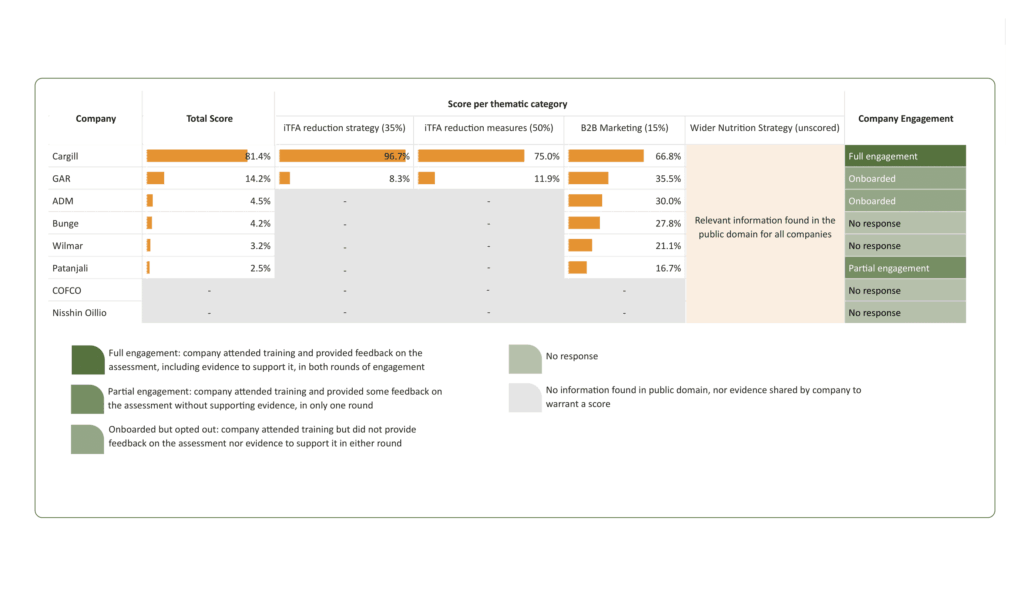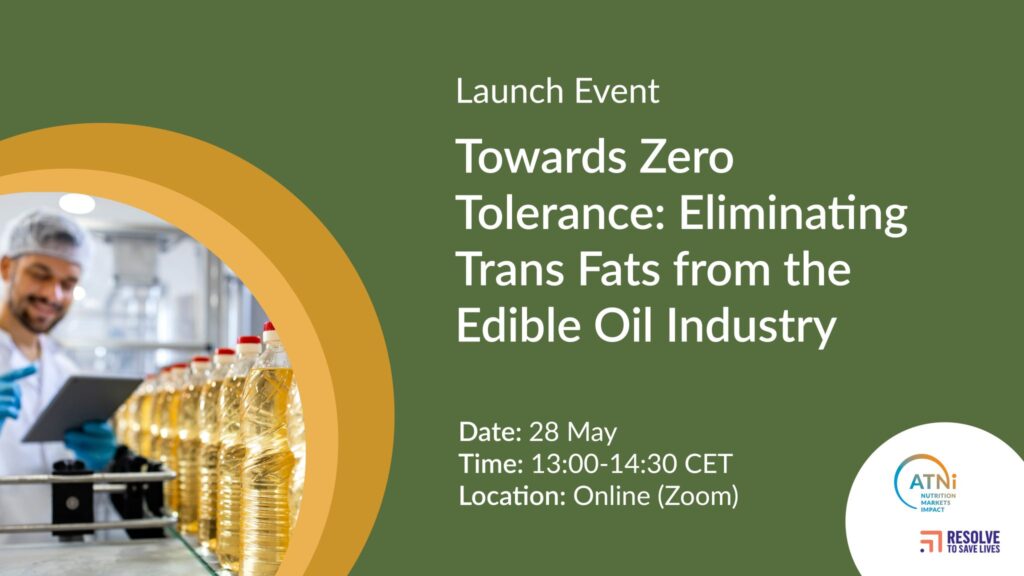
Edible Oil Supplier Index 2025
Assessment of eight leading business-to-business (B2B), edible oil and fat suppliers on their policies and practices to eliminate industrially produced trans fats (iTFA) from the food supply.
Introduction
Industrially produced trans fats (iTFA) are linked to over 278,000 coronary heart disease deaths annually.
Despite clear health risks, regulatory progress remains uneven, with only 56 countries having adopting WHO-recommended limits for iTFAs by the end of 2023.
In response, WHO has urged edible oil and fat suppliers to reduce iTFA through improved refining and the elimination of partially hydrogenated oils (PHOs).
To support this effort, ATNi (Access to Nutrition initiative), commissioned by Resolve to Save Lives, developed the Edible Oil Supplier Index 2025. The Index assesses eight of the world’s largest producers of edible oils—commonly used as ingredients in the food industry—who represent over 20% of the global B2B market for edible fats and oils, employing 19 indicators across four categories.
Company Performance
Companies ranked by their iTFA elimination progress. For more details, see ATNi's dashboard below.

Key Findings
Assessment of companies' commitments and self-reported practices, either in the public domain or confidential submissions.
The level of engagement on the Edible Oil Supplier Index varied widely: only one company fully participated in the assessment; four did not engage, while three partially engaged. Key findings:
- Only two of the eight companies scored on one or more indicators for having an iTFA reduction strategy and iTFA reduction measures in place. The remaining six disclosed no relevant public information nor submitted data for scoring.
- Six companies received scores on at least one indicator on B2B marketing, mainly for disclosing nutritional information. However, the level of disclosure varied across companies, with some reporting exclusively on certain products, or specific markets.
- None of the eight companies were found to have a formal, strategic approach to improving nutrition. Despite this, all referenced their role in addressing public health nutrition challenges.
Overall, it remains unclear whether companies marketing trans-fat-free oil and fat ingredients do so exclusively in markets with WHO-recommended TFA regulations or also in those markets without such policies.
While innovation is important for improving product nutrition, research shows that buy demand for high-quality ingredients, is a key lever of change, alongside policy.
Key Recommendations
This section outlines how industry, governments, investors, and other key stakeholders can support the complete elimination of trans fats from the global food supply.
- Edible oil suppliers should lead efforts to eliminate iTFA by aligning with WHO best-practice standards in all markets and disclose their policies, practices, and progress.
- Food and beverage companies should hold the oil industry accountable and demand TFA-free oils and healthier ingredient options.
- Industry associations to support TFA elimination efforts for all companies—regardless of size or location—by providing technical guidance and establishing codes of practice.
- Governments should adopt and enforce WHO best-practice policies on iTFA elimination, enhance monitoring systems, and ensure the healthiness of fat replacements.
- Investors should use the findings of this Index to drive industry progress in eliminating iTFA and support investments in new technologies to eliminate TFA.
Company Scorecards
Detailed company scorecards outline the companies' performance across key topics. Each scorecard includes an embedded dashboard for easy reference.
Spotlight on India
Insights from India’s implementation of FSSAI’s mandate limiting iTFA to 2% of total fat in all foods. Successful implementation of WHO best-practice TFA policies is driven by:
- Government, industry associations, development partners, and researchers are encouraged to collaborate and align efforts in providing guidance and resources to enable industry implementation of WHO best-practice TFA policy, and especially to support small- and medium-scale companies.
- Industry should engage in peer-to-peer and cross-sector learning to facilitate industry-wide implementation of WHO best-practice TFA policies.
- An appropriate transition period is recommended to allow industry to gradually adapt and adjust production practices.
- In addition to government regulation, the consumer facing F&B industry can be an important lever of change by demanding healthier edible fat and oil ingredients from suppliers, aligning with or exceeding WHO iTFA standards.
- Extending best practices, particularly in unregulated markets can help facilitate the transition.
- The F&B industry, including edible fat and oil producers, are encouraged to disclose iTFA elimination activities to promote transparency, accountability and recognition of these efforts, and demonstrate good practices.

- Robust monitoring systems for total TFA levels in the food supply should be in place to support effective policy implementation.
- The F&B industry, including edible fat and oil producers, are encouraged to disclose total TFA levels in their products to support national monitoring efforts and enable informed purchasing decisions.
Report Chapters
Comprehensive report chapters by category are available below, and you can download each one by clicking on the icon.
Methodology
Compared to ATNi's other Indexes this Edible Oil Supplier Index focuses on a specific nutrition topic—iTFA elimination—and assesses companies' business-to-business (B2B), rather than business-to-consumer (B2C) commitments and activities.
The Edible Oil Supplier Index 2025 assesses the efforts of the eight largest global B2B suppliers of vegetable oils and fats in eliminating iTFA from the food supply chain. It excludes animal-based fats and focuses specifically on B2B commitments.
The Index aligns with WHO’s REPLACE initiative, which calls for iTFA elimination globally by 2025. (WHO recommends iTFA limits of less than 2% of total fats and banning PHO, which can contain 25–45% trans fats).

The methodology evaluates companies across four thematic categories:
- iTFA-reduction Strategy
- iTFA-reduction Measures
- B2B Marketing
- Wider Nutrition Strategy (unscored)
Companies are assessed based on publicly available and confidential submissions. Scores are adjusted using Geographic and Disclosure multipliers to reflect reach and transparency. Some indicators are unscored and are used to provide additional context.
The Index promotes voluntary improvements that go beyond regulation—encouraging companies to offer PHO-free, low-iTFA products even in unregulated markets—and rewards transparency on iTFA elimination efforts and progress.
Reformulating for Health: A Q&A with Flora Food Group on iTFA Elimination
Interview with Paul Whitehouse, former Head of Scientific Affairs at Flora Food Group
“A number of the companies assessed on the Edible Oil Supplier Index are some of Flora Food Group’s strategic partners. Flora Food Group plans on using ATNi’s Edible Oil Supplier Index to discuss the findings with ingredient suppliers and to understand their positions on iTFA.”
“Flora Food Group has not used PHVO since the
company was formed in 2018, continuing
Unilever’s legacy of eliminating PHVO over 15
years ago. Reasons include increased
regulations on iTFA (citing the U.S. Food and
Drug Administration (FDA) ban on PHVO in foods
as of 2018) as well as rising demand from
consumers for healthier products on the
market.”
“Flora Food Group believes
that any company that is beginning its iTFA
elimination journey today is in a much
stronger position than in the past due to
increased availability of evidence-based science,
proven technological solutions, and clear
guidance on recipe reformulation.”

Acknowledgements and Disclaimers
The Edible Oil Supplier Index 2025 would not have been possible without the generous support of Resolve to Save Lives.
The Edible Oil Supplier Index 2025 was developed by ATNi’s project team, which includes Bo-Jane Woods (Project lead), Nadine Nasser (Research lead), Daniela Hernández Morales (Research Support), Geert Van Poppel (Senior TFA Technical advisor) with additional support from Mark Wijne, Efi Chatzinikolaou, and data team members Eaindra Aye, Aurélie Reynier, and communications team members Veronica Maxey, Katherine Pittore, and Gulden Timur. We would also like to thank colleagues for their support in various steps of the process: Babs Ates, Christopher Board, Hammed Jimoh, and Will Sharp.
The ATNi team drew on the expertise and advice of the ATNi Edible Oil Supplier Index Advisory Group members; Vivek Arora (ATNi consultant), Professor Ingeborg Brouwer, Dr. Véronique Gibon, Professor Susan Horton, Professor RBN Prasad, and Dr. Rain Yamamoto.
ATNi would also like to thank Dennis Petri for design support, Wren media for editing and proofreading, September Studio for web support, and 73Bit for setting up the data platform. The findings in this report do not necessarily reflect the views of the group’s members or their institutions.
For more information about the Edible Oil Supplier Index 2025, please reach out to Nadine Nasser at nadine.nasser@atni.org.
(Past) Virtual Event: Towards Zero Tolerance: Eliminating Trans Fats from the Edible Oil Industry


